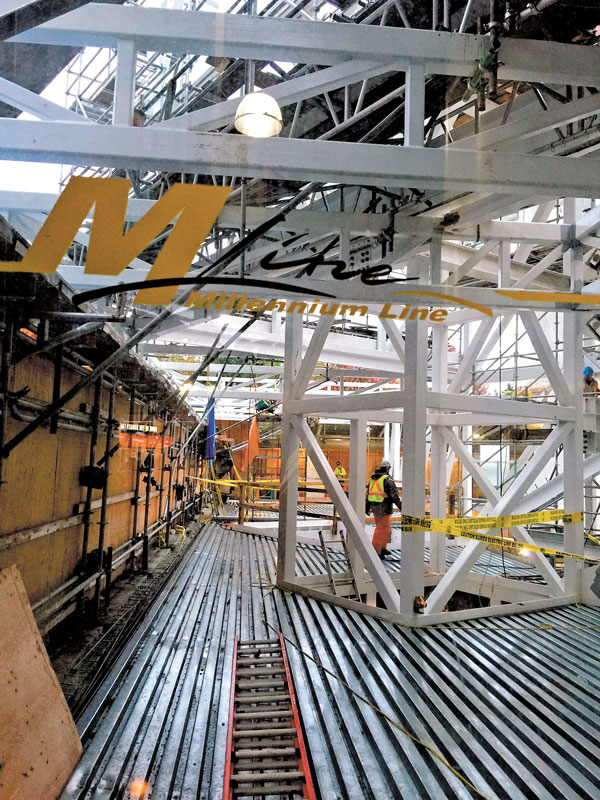Members of the British Columbia Construction Association (BCCA) and other organizations have weighed in from across the province against the recently implemented community benefits agreements (CBAs).
The BCCA held a series of meetings with their members in Vancouver, Prince George, Nanaimo and the Southern Interior in September, and the feedback concerning CBAs was resoundingly negative, said BCCA president Chris Atchison.
“A lot of people in the room understood the reasoning behind hiring locally and hiring Indigenous people, women and others. Where CBAs became unpalatable for them was conscription of workers into a union for major construction projects,” Atchison said.
“The sentiment that came out of the meetings was employers saying that they’ve worked hard to build their teams, so why should they risk fragmenting those teams or the team culture they’ve built on these projects?”
All of the attendees at the town halls regarded CBAs as an onerous clause in procurement, Atchison said, and 96 per cent of attendees stated they would be less likely to bid on projects with CBAs attached.
Atchison also said those at the town halls saw the provincial NDP government as framing the debate in a way that does not reflect the composition of the industry.

“There’s a feeling that government has tried to make this a union versus non-union issue, and the workforce and industry has evolved to where that clearly isn’t the case. It’s evolved to a place where union and non-union work together,” he said.
Atchison also cited the practice of signing workers onto a union as risky for employers once the project is finished.
“If you’re releasing your crew to the crown corporation, you may be getting that crew back plus others, and so it sets up a situation where you don’t have control of your own crew because you have people you haven’t necessarily trained or introduced to your company culture,” he said.
“You haven’t been completely responsible for the crew you received, so how do you mitigate the safety of the crew that’s been handed to you? It elevates the risk of liability around safety.”
The Vancouver Regional Construction Association (VRCA) hosted the Lower Mainland town hall on Sept 19. VRCA president Fiona Famulak said her organization has three major objections to CBAs.
“We don’t like the way it was negotiated and the lack of transparency since it was introduced, the model itself is prescriptive, and it has the potential for serious ramifications for both the industry and B.C. taxpayers,” Famulak said. “And that is a statement we’d make regardless of which party is in power.”
She cited inadequate industry consultation prior to the announcement of CBAs and added the only signatories to the agreement are the provincial government and select unions.
“The majority of the industry is open shop, and 85 to 90 per cent of VRCA is open shop, but we represent both. This is not if open shop or unions should do the work. That’s a red herring,” she said. “It’s about instructing the industry, which is the expert on how to build infrastructure projects, and that’s not appropriate.”
Famulak said while the CBA framework is currently only being applied to the Pattullo Bridge and four-laning the Trans-Canada Highway between Kamloops and the Alberta border, it has the potential to damage smaller firms as well as large-scale companies.
“These are two large projects with many smaller projects beneath them, and they’re all using the CBA model to execute,” she said.
Since smaller firms would likely work on those sub-projects, Famulak said, “the CBA has huge potential to impact not just large companies, but medium and smaller ones.”
Famulak also warned that using CBAs would bring added pressure to a strained labour market.
“The CBA model makes it tougher to attract and retain workers in an already tight labour market. We need all hands on deck, and this model doesn’t facilitate that.”
Famulak noted during the meeting questions were asked by her membership for which she and the industry have no answers yet.
“We know the crown corporation, British Columbia Infrastructure Inc. (BCIB), is mandated to supply all of the workforce and has the ability to delegate functions to the contractors. Does that mean union and non-union companies will lose their employees to BCIB? Will our members lose employees and potentially not get them back again?” she said.
“To assess the risk in order to know if they’ll bid, our members need the details.”
Famulak said the VRCA will continue to oppose the CBA framework along with the BCCA, the Independent Contractors and Businesses Association, the Progressive Contractors Association of Canada and others who recently mounted a legal challenge against the government in the B.C. Supreme Court.
The VRCA will also host an advocacy update for their members on Oct. 17, with half the meeting devoted to the CBA issue.
In a previous statement to the Journal of Commerce, the B.C. Ministry of Transportation and Infrastructure said all contractors can bid on projects under the CBA model.
“Although workers must join a union while they work on the project (as is the case with all unionized worksites in B.C.), they do not need to be unionized before or after working on the project. With CBAs, wages are locked in for the duration of the project and no strikes or lockouts can take place. These predictable labour costs help ensure projects are completed on time and on budget,” the ministry added.











This is bizarre logic. They act as if the contractor owns their employees and they may get stolen by the government. They talk about indoctrinating employees into company culture as if all of their employees have been with them for years, and they never hire anyone new. Construction workers have always been and always will be extremely transient. They go where they get treated the best. Construction companies are used to huge fluctuations in their workforce and are in danger of having their “company culture” corrupted every time they hire someone new; whether that be a project manager, estimator or labourer. This model changes nothing.